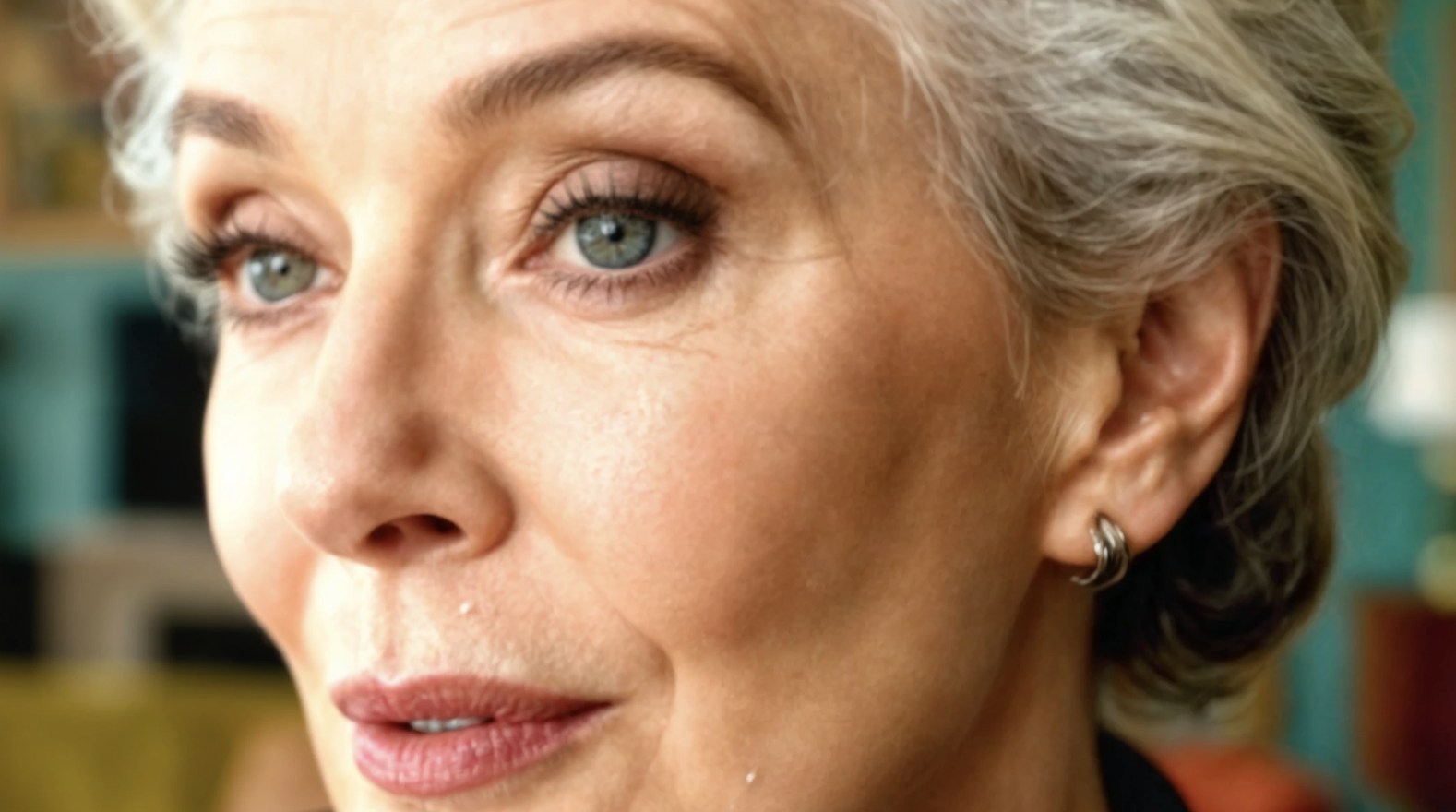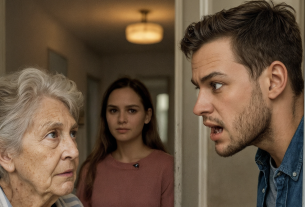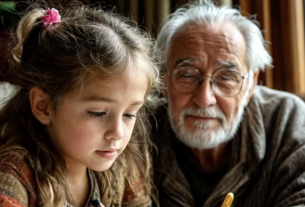Nina never liked that blazer. It hung at the very back of the wardrobe—a bulky, polished monster that took up a third of the room and smelled of mothballs mixed with old paper.
Vitya called the blazer his “concert one,” even though the last time they’d been to the conservatory was in 1989.
Now the thing lay on the table, like a deflated, grayed-out animal.
Vitya had died forty days ago, yet his presence—a clinging mix of cheap “Yava” cigarettes, “Tet-a-Tet” cologne, and some sour dust—still hovered in the apartment. The smell caught in the tulle, clung to the carpet pile, and settled on her tongue like yesterday’s over-steeped tea.
Nina picked up the scissors. Heavy tailor’s shears with black handles. The steel snapped shut with a predatory clack.
She wasn’t going to keep this junk. Valka, the neighbor from the third floor, had come by for salt yesterday and, eyeing the bundles in the hallway, grunted:
“Take it out to the dumpster, Nin. The hobos will sort it out. Don’t turn the apartment into a mausoleum. The living get what’s for the living.”
Valka was a simple woman—rough as sandpaper—but you couldn’t deny her practical sense. Nina decided she’d keep only the buttons. They were solid, horn buttons—heavy, decent.
You couldn’t find ones like that now if you tried—everything was cheap Chinese stamping that melts under an iron. But these would last. Maybe she’d move them onto her own coat, or maybe she’d just pour them into an old tin from Indian tea—let them sit there and rattle.
There was no peace in the apartment. In the kitchen, the Saratov refrigerator buzzed and choked—a tired old workhorse that should’ve been hauled to a landfill long ago, but Vitya wouldn’t allow a replacement.
“It still works, Ninulya—why waste money?” he’d say.
Behind the wall, the new tenants’ hammer drill screamed—endless renovations, as if they weren’t fixing up a flat but digging a bunker. From the street, through a cracked window, came the smell of wet leaves and exhaust.
Nina hooked the bottom button with her fingernail. Her fingers were knotted, with dark veins and age spots—working hands that for forty years carried heavy bags, washed stairwells in the nineties, sorted invoices so there’d be at least a kopeck at home.
Vitya spared his hands.
“Ninulya,” he’d say in his soft baritone, lying on the couch with a crossword, “where are you dragging that sack? You should’ve left it downstairs—I’d… later… somehow…”
But “later” never came. He was an intellectual. An unrecognized philosopher. A man of delicate sensibilities, for whom lifting anything heavy and making decisions was apparently противопоказано—strictly forbidden.
She scraped with the blade. The button flew off and thudded dully against the tabletop.
Nina turned the blazer inside out. The lining was slick, viscose, with tiny stripes. Around the inner pocket, the fabric bulged oddly.
At first Nina thought it was a patch. Vitya liked secrets, liked hiding emergency stashes “for a black day,” though their black day had lasted the past thirty years. But the seam was strange—rough, crooked, stitched with black thread on gray fabric, clearly done in a hurry, with a trembling hand.
Nina frowned. Set the scissors down. Rubbed the bridge of her nose—a habit from the days when she’d spend nights balancing debit and credit for the vegetable depot.
“So what did you sew in there, you great doer?” she asked out loud.
Her voice came out creaky, like the hinge of the balcony door Vitya had promised to oil since their last anniversary.
She picked at the seam with the scissors’ tip. The thread snapped with a dry crack, like a string breaking.
Inside, between the lining and the wool, lay a sheet of graph paper folded into quarters—and a small glossy photograph.
Nina sat down on the stool. Her legs suddenly turned to cotton, heavy with lead. Slowly she unfolded the paper. It was old, yellow at the creases, brittle.
The handwriting was Vitya’s—small, bead-like letters, with elegant curls on the “d” and the “u.” In that same handwriting he wrote his endless diaries about the fate of the motherland, now stacked and gathering dust on the mezzanine.
But this wasn’t a diary.
“Lyusenka, my sunshine. Hold on a little longer. The old woman got her quarterly bonus yesterday, and I managed to pinch a bit from the money she gave for the sanatorium. On Saturday I’ll come on the first bus. We’ll buy little Igor that German construction set he’s been dreaming of. I love you, my little bird. Soon this hell will end. We’ll be together. Yours, V.”
In the corner was a date. Twenty years ago. May.
Nina read it again. Her eyes snagged on a word like on a nail.
“The old woman.”
Back then she had been forty-five.
She remembered that May. She was working two jobs to pay for Vitya’s treatment—he complained of “unexplainable back pain” and demanded special massages. She dyed her hair with henna, wore heels despite her varicose veins, and sewed herself Burda dresses at night. She believed she was still young.
And to him, even then, she was already “the old woman.” A resource. A wallet on legs.
She picked up the photograph.
In the picture, in front of some park with a peeling bench, stood Vitya—young, fit, wearing that same “stupid” cap he claimed he’d lost.
He had his arm around a woman—small, bony, with a startled doe’s eyes. Beside them stood a boy of about five, holding Vitya’s hand. The boy was his father’s copy: the same ducky nose, the same stubborn chin, even the ears sticking out in the same way.
Nina set the photo on the table, beside the cut-off button.
Nothing stabbed in her chest. Nothing collapsed. Nothing snapped.
It just turned cold. The way it does when you step out of a warm stairwell into an autumn wind, and the icy air hits you under the ribs and freezes you hollow.
Twenty years ago.
So it was she who bought that “German construction set.” With her bonus. With the money she’d been saving for dental work—but gave him instead “for procedures.”
She remembered how he’d come back from those “procedures” and “fishing trips”—rosy-cheeked, bright-eyed.
“Fresh air heals, Ninulya,” he’d say, packing away the cutlets she’d spent half the evening making. “Nature cures.”
And she’d be happy. She’d look at him and think: Thank God, he’s better. I’m strong. I’ll endure—anything, as long as Vitenka isn’t sick.
She stood up. Her knees cracked loudly, dryly. She went to the window.
In the courtyard, the wind chased an empty plastic bag across the asphalt. A streetlamp blinked, as if winking at her: Well, idiot—did you enjoy the movie?
“Old woman…” Nina whispered.
The word was nasty, sticky.
She remembered how five years ago he hadn’t come to the hospital when she had her appendix removed. Said he had a “migraine” and couldn’t stand the smell of bleach. She lay in the ward, stared at the ceiling, and pitied him. Poor Vitya—how is he there alone, without soup?
And he, probably, was calling his “little bird.” Or maybe not anymore?
If the date was right, little Igor would be twenty-five now. A grown man. Maybe he even came to his father’s funeral—stood somewhere off to the side, behind the fence, while she—the “old woman”—sobbed over the coffin and straightened the wreaths.
Anger rolled in slowly, heavily, like water rising in a clogged sink. Murky, dirty anger.
Not at him.
At herself.
For believing. For living with her eyes shut. For being proud of her patience. “Vitya and I—forty years, soul to soul…”
What soul, to hell with it? He lived off her, despised her, called her an old woman, but didn’t leave. Why?
Because it was convenient. The little bird needed feeding, the little bird needed rent, and here was an arranged life: hot borscht, washed shirts, and a wife who wouldn’t say a word back—just hand over money.
He was simply a coward. He stayed where it was comfortable. And “Lyusenka,” with the child, he apparently abandoned when the money ran out or when he got tired of playing at romance. Or she threw him out herself once she realized there was nothing to get from him except medical test results.
Nina went back to the table. Her eyes fell on the tin she’d planned to put the buttons in—old, metal, with half-worn elephants on its side.
She grabbed it. Her fingers clenched so hard the tin caved.
With a swing and a guttural breath, she hurled it at the wall.
The crash was impressive. The tin bounced off, clattered across the floor, the lid shot into a corner.
Nina stood there, breathing hard, bracing her hands on the edge of the table.
Something inside was boiling. She wanted to tear the apartment apart. Rip off the wallpaper she’d glued up herself while Vitya “supervised” from the couch. Throw out this table. Burn that damned blazer.
The doorbell rang—insistent. Once, twice, three times.
Nina wiped her face with her palm. Her skin was dry and hot.
She went to open the door, slapping in her slippers over the linoleum, stepping over the invisible ruins of her life.
On the threshold stood Valka—in a robe dusted with flour, a towel on her shoulder.
“Nin, what’s going on? You got a war in there? The whole stairwell heard it. I thought your sideboard collapsed.”
Nina looked at her—at her double chin, at her living, worried eyes.
“It’s a tin, Valya. Just a tin.”
“Well thank God,” the neighbor breathed out, pushing her way into the hallway. “Because you’re pale as a moth. Blood pressure? Or are you killing yourself again over your idol?”
Nina gave a crooked smile.
“I’m not killing myself. I’ve seen clearly.”
She went back into the room. Valka trailed after her. Took in the mess: the torn-open blazer on the table, the scissors, the photo.
Valka was curious as a magpie. She spotted the picture at once.
“Whoa…” she drawled, picking it up. “That’s your Vitya? Look at him—young eagle. And who’s that fancy thing? Not you—no offense. You’ve always had some meat on you, and she’s a dried fish.”
“That’s Lyusenka,” Nina said in a flat, dead voice. “His little bird. The love of his life.”
Valka’s gaze flicked to the note. She read. Her eyebrows climbed up under her fringe.
“‘Old woman’?” she whispered. “That’s you he means? At forty-five?”
“Me, Valya. Who else? Sponsor of the banquet—old woman Nina.”
Valka dropped onto the chair; it squeaked pitifully.
“Well I’ll be…” she exhaled. “What a parasite! You know, Nin, I suspected… Not that I knew for sure. But I saw him a couple of times in town, maybe fifteen years ago. Walking with someone, holding hands. I thought—niece, who knows. So he was buying German construction sets…”
Nina was silent. She took the blazer by the lapels. The fabric felt unpleasant, prickly.
“Forty years, Valka. I cooked him diet food. I got him vouchers. I didn’t buy myself boots—just replaced the heel tips five times over—so he’d have enough for his… for his dream.”
“What dream?” Valka waved it off. “He was a coward, your Vitya. A parasite.”
And Nina suddenly felt a tight spring inside her loosen.
“A coward,” she agreed. “And a bastard.”
She crumpled the blazer. Furiously—almost with pleasure, crushing the stiff wool.
“That’s it, Valya. Enough.”
She shoved the blazer into a big black trash bag she’d prepared in the morning. In went the pressed trousers she’d ironed through gauze. The ties. The shirts that required “hand wash only.”
“Nin, what are you doing?” Valka stared at her with respect. “All of it? Seriously?”
“All of it. Down to the last thread.”
Nina tied the bag in a knot. Tight, until her fingers hurt.
“Valya, do me a favor. Take this to the dumpster. Now. I can’t look at it. I’ll suffocate in here.”
The neighbor nodded, stood up, hefted the bundle. It was bulky—but surprisingly light. The life of an empty person doesn’t weigh much.
“And the buttons?” she asked at the door, nodding at the one still on the table. “They were good ones.”
Nina looked at the black disc.
“Trash,” she said sharply. “Along with the memories. Along with Lyusenka, the construction set, and my stupidity. I don’t need anyone else’s buttons.”
The door slammed.
Nina was alone.
The drill behind the wall fell silent—smoke break for the workers. She could hear the kitchen faucet dripping now. Drip. Drip. An annoying sound she’d never noticed before, because she was always afraid to disturb Vitya’s sleep.
She went into the kitchen and twisted the valve shut with force. The water stopped.
She put the kettle on. Not the pretty one with a whistle they’d “saved,” but the ordinary enamel one, with a chipped spot on its side.
She opened the cupboard and took out the tin of expensive Ceylon tea that was kept “for a special occasion.”
“Well,” she said loudly, “here it is—the occasion.”
She brewed it strong, not sparing the leaves. Poured it into a big mug with red poppies—her favorite one, which Vitya forbade her to use because “it’s vulgar, Nina, drink from the service.”
She took the sugar bowl. Three spoonfuls. Heaping.
She stirred, tapping the spoon brightly against the cup. Clink-clink-clink. The music of freedom.
She took a sip. Sickly sweet, hot, delicious.
Sitting on the stool with one leg tucked under her, she looked at the dark window.
Forty years. Was it a waste? Enough to grind her teeth. Was it bitter? Enough to make her nauseous.
But something strange happened: along with the hurt came relief. Huge as the sky.
No more lying to herself.
No more saving on herself to buy his placebo “medicine.”
No more listening about his delicate nature, knowing that nature was simply rotten.
Tomorrow she’d get her pension—her own.
And she wouldn’t go to the pharmacy.
She’d go to a pastry shop. She’d buy a cake—Prague, the fat chocolate one Vitya called a “cholesterol bomb.” And she’d eat it. A big slice. No—two slices.
Nina stood, went to the window, and flung both panes open.
A cold autumn wind burst into the smoky, stale apartment. It smelled of rain, wet asphalt, and something new. It drove out the stink of cheap cologne and old lies.
Nina drew a deep breath. The air burned her lungs—but it was a pleasant pain.
“Old woman, am I?” she asked the darkness beyond the window. “We’ll see about that.”
She went back to the room and turned on the radio. Loud. Something silly played—modern, rhythmic.
Nina straightened her back, squared her shoulders. Her spine cracked as it unbent after forty years of a bowed life.
Life was only beginning. And this time, it would be hers.
EPILOGUE
A week later Valka ran into Nina by the entrance and nearly dropped her bag.
“Ninka? Is that you?”
Nina wore a new coat—bright electric blue. Lipstick. And new boots with a steady heel.
“Me, Valya. Who else?”
“And where’d you get the coat?” the neighbor gasped. “Must’ve cost a fortune!”
“It did,” Nina nodded, squinting into the autumn sun. “Bought it with the funeral money. Vitya wouldn’t have approved. He’d have called it wasteful.”
She winked at the stunned Valka.
“And you know what? I don’t care. I’m warm.”
And she strode down the street, her new heels clicking, never looking back, while in the windows of their former shared apartment the wind stirred new, snow-white curtains.

In my late husband’s jacket, I found a hidden pocket. After reading the note, I realized: for 40 years I’d been living with a scoundrel…
Advertisements


